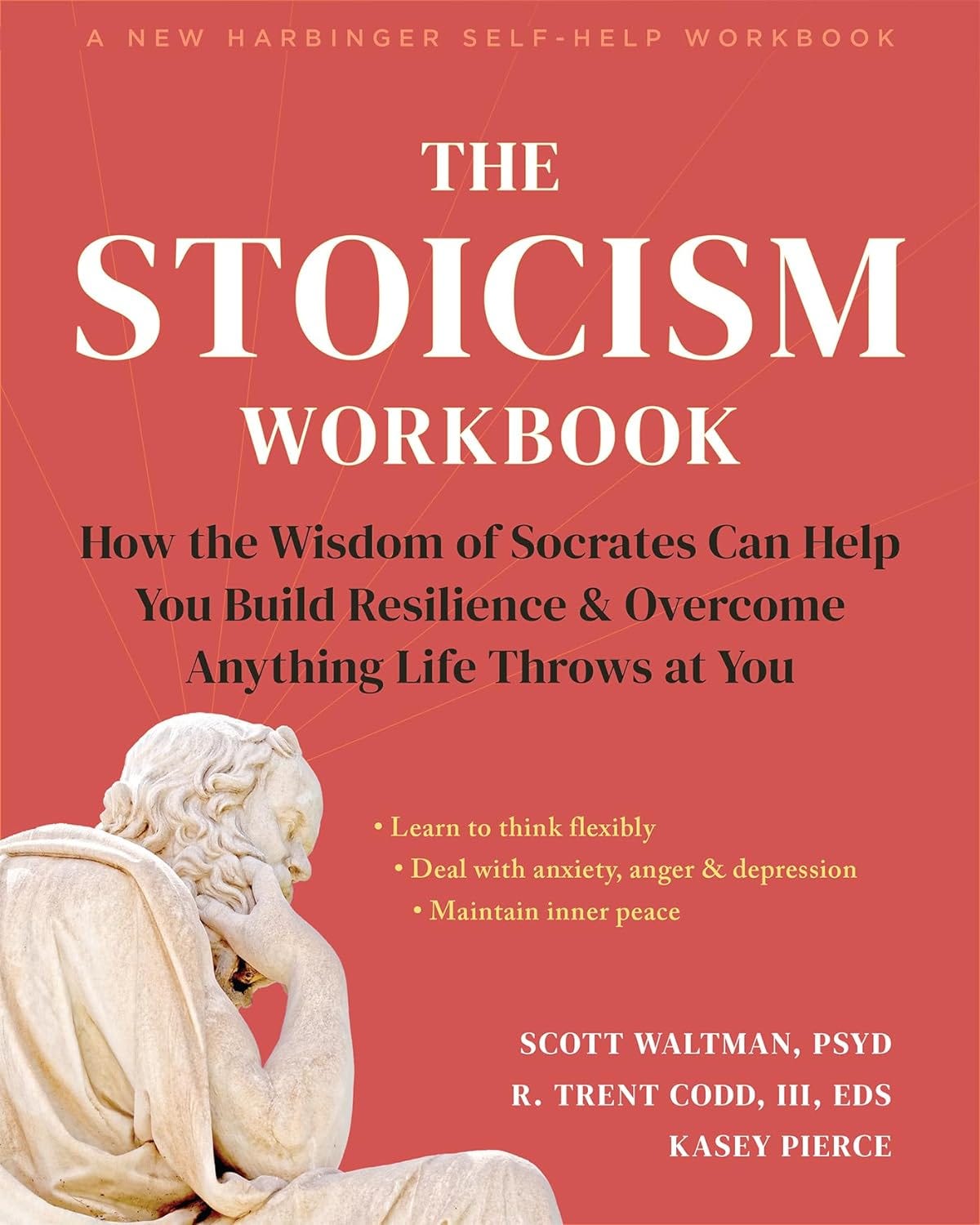The Stoicism Workbook
Read this excerpt from co-authors Scott Waltman, R. Trent Codd, and Kasey Pierce
Please enjoy this advance excerpt from The Stoicism Workbook, to be released July 1st, 2024. Special thanks to New Harbinger.
The wisdom of ancient philosophers like Socrates, Marcus Aurelius, Zeno, and Epictetus will help you learn to identify what truly matters in life and develop the resilience needed to pursue it. This practical self-help workbook combines ancient philosophy with modern psychology, empowering you to think flexibly, maintain inner peace, adapt to challenges, and enhance your mental well-being. Explore the core Stoic virtues of wisdom, justice, courage, and temperance, serving as your guiding compass in today's uncertain world. Stoicism doesn't mean suppressing emotions but rather creating space for reflection, finding opportunities in adversity, and taking control of how emotions impact you – the keys to lasting happiness that this workbook will help you unlock. Embrace this ancient wisdom and integrate it into your daily life with The Stoicism Workbook.
Selections from Chapter 6: Tolerating Discomfort and Decreasing Suffering
When we trade in emotional discomfort for the brief freedom from having to feel it, we are no longer in control of our own lives and have let fear dictate when we socialize, when we speak up, and essentially make decisions for us.
Our suffering is created more in our mind and exists less in reality.
- Seneca (On Groundless Fear 13.4)
The easiest and most effective way to avoid stressful situations is to simply avoid them. The easiest and most effective way to overcome anxiety, however, is by subjecting yourself to those same stressful situations. When we trade in emotional discomfort for the brief freedom from having to feel it, we are no longer in control of our own lives and have let fear dictate when we socialize, when we speak up, and essentially make decisions for us.
The best of intentions will never be a full-proof line of defense against stressful or even tragic events befalling us. When the unfortunate does occur, we are presented with an immediate choice: endure the long-lasting effects on our well-being, or cope healthily by utilizing our wisdom to see the grand scheme.
Cato the Younger: Stress Exposure and Doing the Right Thing
In Plato's Republic, Socrates asserts that the truly wise individual understands that excessive complaining when faced with misfortunes yields no benefit, as "there is no advantage in taking them to heart."
Drawing upon similar principles of self-discipline and resilience, Cato the Younger was a Roman statesman and orator who lived from 95 BCE to 46 BCE. He was also a Stoic philosopher and was greatly influenced by the teachings of Cleanthes. He lived simply, valued integrity, and put his life on the line in opposition to political corruption; strongly opposed to the rise of Julius Caesar and his dictatorship. Famously, he also willingly exposed himself to stress in the name of self-discipline and the pursuit of virtue. Plutarch, a biographer and Platonist of the time, records that Cato would engage in wearing a heavy helmet and even heavier armor during his daily activities in order to build endurance and resilience against pain. He would also perform long marches and drills on his own accord wearing this hot, cumbersome gear to strengthen his mind as well as his physical strength.
Now, it wasn’t the reputation he was aiming for in his voluntary stress exercises. It was to adopt and foster the perspective that there is reward that lies beyond the endurance of the stress. Although he proved this many times in his career, this perspective was never more evident than when he was urged to seek an oracle to predict the outcome of his upcoming battle against Caesar. He dismissed this idea because to him, that wasn’t the point. Even if it was prophesied that they would lose, he was not going to retreat because rising up against tyranny is simply the right thing to do.
Keep reading with a 7-day free trial
Subscribe to Plato's Academy Centre Newsletter to keep reading this post and get 7 days of free access to the full post archives.



